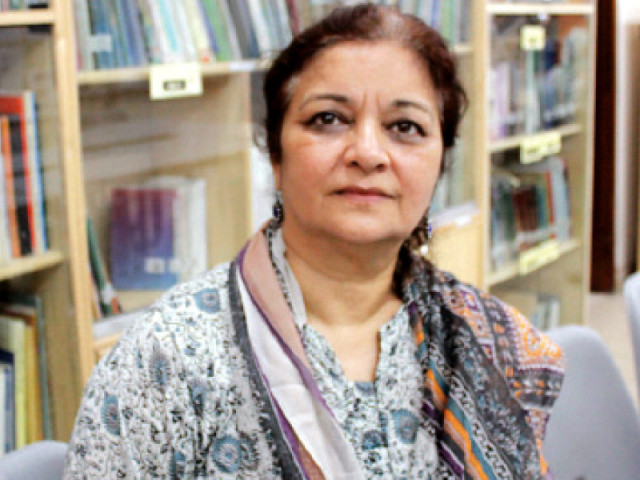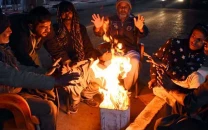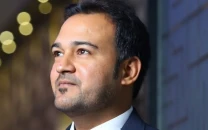A bleak future: Sindh’s apathy towards its children reflects in the education curriculum
Over 0.5m children study in pre-primary schools with no proper framework.

If you want to see how Sindh has failed its children, consider the situation of over half a million kids between the ages of three to five years, whose parents make them attend pre-primary classes in public schools, for which the government has yet to induct professionally-trained teachers on the early childhood education (ECE) curriculum.
In the absence of any generic implementation framework to streamline ECE in public schools, these children somehow attend pre-primary classes - colloquially referred to as 'katchi' - in a multi-graded environment at the majority of the 44,500 primary schools in the province.
Since only nine per cent of these primary schools have five or more rooms, according to the official Sindh Education Management Information System (Semis) records, the pre-primary students as well as the students from grades I to V cram together in a couple of classrooms, without proper rooms allocated for each class and teachers not knowing how and what to teach.
Parental emphasis on education
Despite the alarming situation in public schools, most parents belonging to the impoverished rural Sindh districts have effectively debunked the myth - politically perpetuated to cover up the shocking failure of governments - that it is the people and not the government who place education on the back burner. By sending their children to the derelict public education system, they also offer substantial grounds for the political elite to think that students' enrolment could have been unprecedentedly increased, had the public education system offered any real 'education' to their children.
Perhaps, Balli, whose family comprising 10 children and a husband, Bhiko Mal, was busy in picking cotton in a field in Matiari district, would not have said: "I sent my three sons to the school [Government Boys Primary School in Miranpur village], but they did not even learn to write the numerals after studying up till grade V. Now, they all help us in the fields."

Decline in ECE enrolment
What is alarming, albeit unsurprising keeping in view the state of public schools, is that overall enrolment in katchi classes, according to Semis data, had declined from over 700,000 children to around half a million since 2010. Corresponding to this, the Annual Status of Education Report (Aser) 2013 indicated that around 37 per cent of the children between the ages of three and five years were attending some kind of early education at public schools.
"This means that around 59 per cent of the children in this age-group were out of school in Sindh, if we add up around four per cent of the children who are enrolled in seminaries or playgroups at private schools," said Baela Raza Jamil, the programmes director at the Idara-e-Taleem-o-Aagahi. "But over half a million students in the indigenous ECE classes is still a large number that should have prompted the government to formalise the pre-primary classes by considering the induction of trained teachers."
Since the ECE has not been formalised, added Jamil, there is no separate identification of pre-primary schools or classes in the official government data and pre-primary schooling does not stand on its own as a separate entity.
The situation portrays a grim picture, when across the globe, the value of early childhood education has been recognised as a critical investment. "This helps children and families engage early in development and make smooth transition from pre-school to primary and post-primary education, said Jamil. "So far in Sindh, the primary purpose of katchi classes has been just to familiarise children with the not-so-impressive school sand, therefore, no extra efforts were made to professionally develop the katchi classes."
The ECE, on the other hand, requires an effective teaching and learning environment that ensures proper management of classrooms, a prescribed curriculum, availability of learning resources and, above all, provision of skilled and dedicated teachers - this, however, was not considered necessary for teaching in a katchi class.
Through the history
Though the emphasis on ECE in public schools can be traced to right after the partition, when the first ‘All-Pakistan Educational Conference’ was held in 1947 from November 27 till December 1 in Karachi, it took successive governments 55 years to develop a national curriculum on ECE in 2002.
During the conference, the sub-committee on primary and secondary education had proposed pre-primary education as an integral part of mainstream education. The step led to the introduction of ‘katchi’ classes at public schools in the early 1950s as an indigenous approach to early childhood education in the provinces, including Sindh.
Pre-primary education, however, became a forgotten subject for the next four decades during which subsequent education policies did not even make a reference to the ECE. Finally in 1992, the national policy on education reiterated the need to mainstream the katchi classes. The policy again turned out to be a mere verbal declaration that - if it did anything at all - reverberated through the corridors of Tughlaq House [Sindh Civil Secretariat] for some time as a consequence of political neglect of education. The most recent National Education Policy approved by the federal cabinet in 2009, again proposed that early childhood education be a part of the main stream education, integrated in all primary schools.
Speaking about the existing ECE set-up, Dr Muhammad Memon, a professor and former director at Aga Khan University’s Institute for Educational Development, said that the initiative was an experiment without any explicit policy guidelines and an inadequate investment without any clear goals and intended returns. “Despite having a provincial version of the revised national ECE curriculum, the katchi classes continue to function on the same experimental pattern today,” said Dr Memon. “There has been minimal meaningful involvement of the state in increasing access to early childhood education and development as well as improving its quality.”
Published in The Express Tribune, October 14th, 2014.



















COMMENTS
Comments are moderated and generally will be posted if they are on-topic and not abusive.
For more information, please see our Comments FAQ